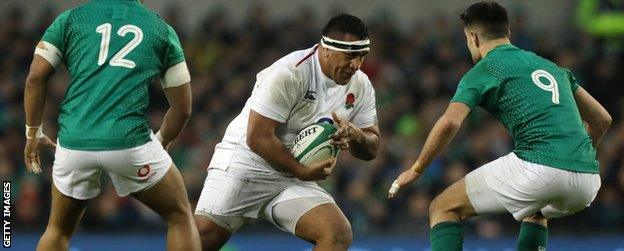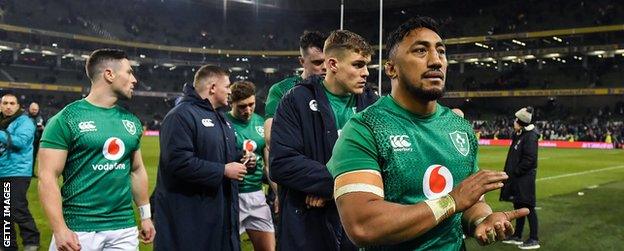Six Nations: England back with a bang after win over Ireland
- Published
- comments
Six Nations: England beat Grand Slam champions Ireland 32-20
A cloudless blue-sky day in Dublin, a perfect storm from England.
If you saw this 32-20 win coming then you should now be able to afford a lackey to read this on your behalf. There is the scoreline, there is the performance that produced it and there is what the combination of the two might do for Eddie Jones and how his story ends.
England routinely come to Ireland to be sent home yelping with tails between legs. One Six Nations win here since 2003. No tries in eight years. Ireland on a run of 12 home wins on the bounce and 18 victories from their past 19 matches.
It could have been more, comfortably. Owen Farrell left five kickable points out there, not that he should care. Mako Vunipola had a borderline try ruled out. John Cooney's consolation at the death was barely that at all.
If England appeared unrecognisable from recent flawed incarnations it was because they were. This XV had never started together before. The back row were a new combination. The centre pairing was unproven.
And yet there was a glorious familiarity about it for England supporters whose faith in Eddie Jones and his methods had been tested over a 2018 when they often appeared lost.
Six Nations Shuffle: Howlers, hat-tricks, freezing temperatures & epic comebacks
The two Vunipolas, Mako and his brother Billy, carrying like bulldozers and felling men like human chainsaws. Manu Tuilagi bouncing defenders off him like a big kid running through a ball-pool. An angry, relentless intensity to it all that fed back on itself to create a vicious white cyclone that stopped most things in its path.
England have waited a long time for a display like this. Their best under Jones, certainly, their most impressive probably since the defeat of the All Blacks in December 2012.
Tuilagi was unstoppable that day too. The quicker thinkers may discern a connection there. There's a reason why every England coach has been desperate for him to find his legs and keep his head.
A brutal nip in the winter air all day, met by plenty in the crowd with many a nip on the flask, yet England's defence was hot enough to leave scorch-marks all over green jerseys.
They were up fast and they made big dents. A game won by 12 points off 40% possession needs something special to square the sums and England defence coach John Mitchell's broad white line was it.
Collectively his men made 186 tackles to Ireland's 115. Mako Vunipola made a remarkable 23 on his own, Mark Wilson 21, Tom Curry 16.
Eddie Jones delighted with 'top of the class' Mako Vunipola
"We were physically bettered," Ireland coach Joe Schmidt said afterwards. At least that might be what he said. With his Kiwi accent it sounded just as much like "battered". Both were accurate.
England in the autumn were a team that played in patches. One good half against the Springboks, a solid 20 minutes against Australia, deservedly behind at half-time to Japan. On Saturday they came out like a pack of wild dogs and kept chasing and biting until the end.
"The intensity they brought to the game…" wondered Schmidt, shaking his head. "It was a simmering physical intensity that made the pitch a suffocating place to be tonight."
England's habitual defeats in this city have usually come under an aerial assault. The Irish half-backs hoist the ball into the wet skies, English full-backs and wingers spill it, the crowd get even louder. On Saturday Elliot Daly and Jonny May were almost faultless, and an eerie silence followed.
It left Ireland bemused enough that they seldom tried to vary it and kick instead for space behind the defence, even when England repeatedly demonstrated the profit that could be gained by such obvious variety. Daly's try came from his initial grubber through. Henry Slade's first came from May's boot ahead. Time again Farrell and Ben Youngs turned Jacob Stockdale and the uncomfortable Robbie Henshaw.

Mako Vunipola was man of the match on his 52nd England appearance
When the chance came to attack, the big ball-carriers made yards and produced quick ball. Mako Vunipola again topped his team's charts with 11 carries, but there were options throughout the pack and backline.
"I don't think I've seen a game where our opponents have carried physically like that," admitted Schmidt, close to glassy-eyed.
All of which would have been wasted had there not been a clinical edge to England's finishing to match. Farrell's flat miss-pass that created the space for May's try, Slade's repeat trick an hour later up the other end. England's only win here in 16 years came from four Farrell penalties. Four tries was no-one's idea of a safe bet.
The silver lining for Ireland, if there is one, is that it is February not October. Better to be ransacked now than come the World Cup.
This defeat will trigger a few dark nights of the soul for Schmidt and his lieutenants. The gap between the two teams on the pitch means it has to. Ireland have now lost the last 21 games in which they were more than a point behind at half-time.

Ireland went in 17-10 down at half-time
But this is what the Six Nations is like. There is a reason why no team has won back-to-back Grand Slams since five became six. The best teams are separated by little. There is always a bogeyman hiding round the next corner.
Expectations may be lowered a little. There will be less talk about going to the World Cup as close to favourites. These are good things. They are still the world team of the year, with the world coach of the year, and the world player of the year.
And yet Schmidt was right to talk about physical and emotional bruises. World Cup winners cannot afford to repeatedly start tournaments slowly. They have to find answers when their carrying game is closed down and their ball slowed.
They have time. Now it is Jones who must manage expectations, who must find consistency to back this up, who must keep fit a 10-12-13 axis that he has stumbled upon through injury to others.
"These games have got nothing to do with the World Cup," he declared afterwards, trying to keep that grin off his chops. "They are standalone games. We'll start worrying where we are in the World Cup 10 days before our opening game against Tonga."
But there was a swagger there too that he struggled to disguise. After 12 months where his team appeared to take a gap year off to explore some not particularly attractive places, they are back with an almighty bang.
"I know the next game's going to be better," said Jones, ominously. "We're nowhere near our best. We're looking forward to playing better, and we will."
Six Nations 2019: England beat Ireland up - Schmidt